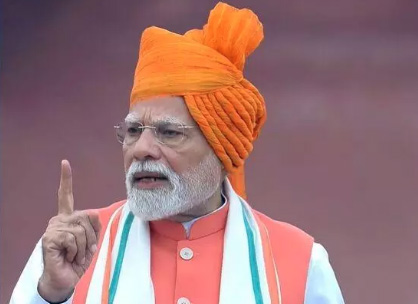New Delhi: On the 79th Independence Day, Prime Minister Narendra Modi addressed the nation from the Red Fort, emphasizing a future built on continued reform, self-reliance, and empowerment. He stated that after a decade of “reforming, performing, and transforming,” the time has come for India to accelerate its progress with even greater strength, working toward the goal of a ‘Viksit Bharat’ (Developed India).
The Prime Minister’s address highlighted the government’s commitment to creating a modern, efficient, and citizen-friendly ecosystem by simplifying laws, encouraging entrepreneurship, and ensuring every Indian can contribute to national development.
PM Shri Modi noted that the government has already undertaken a significant wave of reforms over the past years, which has included abolishing over 40,000 unnecessary compliances and repealing more than 1,500 outdated laws. He specified that in the most recent parliamentary session alone, over 280 provisions were removed to make governance simpler and more accessible.
He emphasized that these reforms are not merely economic but are aimed at transforming the everyday lives of citizens. Key achievements highlighted in his speech included:
Income Tax Reform and Faceless Assessment: A move to make the tax system more transparent and efficient.
Zero Tax for Income up to ₹12 Lakh: A benefit that he said was previously unimaginable for many.
Indian Justice Code: The replacement of outdated criminal laws to simplify justice and legal procedures.
The Prime Minister stressed the government’s focus on creating a conducive environment for business growth. By reducing compliance costs for startups, MSMEs, and entrepreneurs, the government aims to free them from the fear of arbitrary legal actions, thereby encouraging innovation and economic self-reliance.
In a major announcement, PM Modi revealed the formation of a Task Force for Next-Generation Reforms. This task force is mandated to evaluate all current laws, rules, and procedures related to economic activities with the specific goals of:
- Reducing compliance costs for businesses.
- Providing freedom from the fear of arbitrary legal actions.
- Streamlining laws to improve the ease of doing business.
Furthermore, PM Modi announced a “Diwali gift” for the common citizen: the introduction of Next-Generation GST reforms by this Diwali. He stated that these reforms are aimed at reducing taxes on daily-use items, bringing down the tax burden on the common man and stimulating economic activity.
PM Shri Modi concluded his address by reiterating that India must focus on its own progress and strengthen its capabilities in a world of rising economic self-interest. He underscored that the announced reforms are just the beginning of an accelerated phase of governance transformation, aimed at making India more resilient, inclusive, and globally competitive.


